|
|
|
Sort Order |
|
|
|
Items / Page
|
|
|
|
|
|
|
| Srl | Item |
| 1 |
ID:
138905
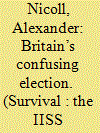

|
|
|
|
|
| Summary/Abstract |
Were it to be a straightforward ‘economy, stupid’ contest, the Conservative Party, led by Prime Minister David Cameron, might be expected to triumph in Britain’s 7 May 2015 general election. The government that took office in 2010, a coalition between the Conservatives and the third-placed Liberal Democrats, inherited a large budget deficit and a steep recession that had
begun with the 2008 financial crisis.
|
|
|
|
|
|
|
|
|
|
|
|
|
|
|
|
| 2 |
ID:
102748
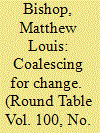

|
|
|
|
|
| Publication |
2011.
|
| Summary/Abstract |
In May 2010 two elections took place in traditional 'Westminster' polities-the United Kingdom and Trinidad and Tobago-in which coalition governments took power. In both countries, a significant part of the discourse in the run-up to election focused on the inequities of the Westminster model, and, in particular, first-past-the-post. Yet, interestingly, the end result in many ways mirrors the kind of outcome often championed by supporters of more proportional electoral systems. This article compares and contrasts the two different elections, and asks whether such coalitions are set to become a regular feature of a more mature Westminster model.
|
|
|
|
|
|
|
|
|
|
|
|
|
|
|
|
| 3 |
ID:
117496
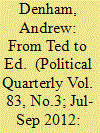

|
|
|
|
|
| Publication |
2012.
|
| Summary/Abstract |
Since 1965, British political parties have radically, and repeatedly, changed the ways in which they choose their leaders. In this article, I explain how and why these changes occurred and assess the consequences of the 'new' selection procedures adopted by four 'mainstream' parties: Labour, the Conservatives, the Liberal Party and the Liberal Democrats. In the first section, following Sjoblom and Stark, I outline a theoretical framework which purports to explain the criteria used by parties in parliamentary systems when choosing their leaders. I then examine the four parties in turn and consider two questions. First, how and why has the process of selecting British party leaders changed over time; and secondly, to what extent, and why, have the 'new' selection procedures adopted since 1965 produced different outcomes, resulting in the election of leaders who would not have been chosen had the decision rested with their party's elites and/or MPs alone?
|
|
|
|
|
|
|
|
|
|
|
|
|
|
|
|
| 4 |
ID:
105873
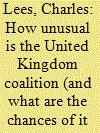

|
|
|
|
|
| Publication |
2011.
|
| Summary/Abstract |
This article draws upon insights from theoretical and empirical studies of coalition behaviour in multiparty politics to examine the formation of the United Kingdom coalition following the general election of 6 May 2010. It argues that the formation of the Conservative-Liberal Democrat coalition is not unusual in historical terms or in the context of contemporary European politics; and that although it is a break from the more recent pattern of postwar British politics it nevertheless does conform to expectations in the light of the coalition literature. The article also provides a comparative analysis of the impact of Britain's 'First-Past-The-Post' (FPTP) electoral system on party competition and an examination of the performance of the Alternative Vote (AV) system and argues that if the United Kingdom retains FPTP then a return to single-party government in 2015 is highly likely; and it is not inevitable that the introduction of AV would significantly advantage the Liberal Democrats.
|
|
|
|
|
|
|
|
|
|
|
|
|
|
|
|
| 5 |
ID:
105869
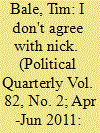

|
|
|
|
|
| Publication |
2011.
|
| Summary/Abstract |
Insider and journalistic accounts of the formation in May 2010 of the Conservative-Liberal Democrat coalition actually, although not explicitly, rely on types of explanation familiar to those who study politics. They tell us that structure (or at least the economy) was important. So too, they suggest, were institutions (timing and the rules of the game). They also stress the importance of contingency ('events, dear boy, events') and agency (who did and said what to whom). While none of these things were unimportant, they only served to make certain an outcome that anyone with a passing acquaintance with the theory and the practice of coalition formation would have predicted-namely a 'minimum winning coalition'. The only thing that could have made that outcome uncertain was a fundamental ideological difference between the two parties involved; however, it quickly became apparent-to the surprise of those of us who failed to appreciate how much the Liberal Democrats had changed-that no such difference existed. Indeed, it is possible to argue that the coalition formed was not merely minimum winning but 'minimum connected winning'. As such, its formation was not so much breathtakingly bold and exciting as pretty much inevitable. In the end, the maths and the physics mattered more than the chemistry. Fortunately for the Conservatives, the Liberal Democrats seriously underplayed their hand in the negotiations, with possibly disastrous consequences for them in the long term.
|
|
|
|
|
|
|
|
|
|
|
|
|
|
|
|
| 6 |
ID:
138278


|
|
|
|
|
| Summary/Abstract |
The Coalition took office in 2010 in what seemed to be a relatively benign foreign policy environment. Since then, the international environment has become far more treacherous and the government has considered war on humanitarian grounds on three occasions. In light of the silence of early Coalition documents on humanitarian intervention, together with the two parties’ different positions on the issue, this article assesses the extent to which the Coalition has adopted a distinctive approach to humanitarian intervention. In so doing, it evaluates the relative importance of Conservative and Liberal Democrat traditions in determining the direction of Coalition foreign policy. The article also considers whether there are other, more pertinent factors driving foreign policy, and offers an explanation for its relative isolation from coalition tensions. It concludes by reflecting on the likely future of humanitarian intervention after the May 2015 general election.
|
|
|
|
|
|
|
|
|
|
|
|
|
|
|
|
| 7 |
ID:
138276
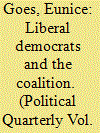

|
|
|
|
|
| Summary/Abstract |
When the Liberal Democrats joined the Coalition government in May 2010, there was an expectation that they would have a restraining effect on the Conservatives, particularly in the area of European politics. But after almost five years as the junior party in the Coalition, the Liberal Democrats struggle to demonstrate their influence over the government's approach to Europe. Not only did they let the Conservatives lead the Coalition's European agenda, but they will be forever associated with the government that brought the UK closer to the exit door of the European Union. The article argues that this outcome is the result of a series of avoidable if surprising mistakes, such as the choice of ministerial portfolios and the party's attitude to the Coalition's monitoring mechanisms, as well as some unavoidable mistakes that could have not been foreseen when the Coalition was formed.
|
|
|
|
|
|
|
|
|
|
|
|
|
|
|
|
| 8 |
ID:
122483
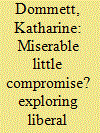

|
|
|
|
|
| Publication |
2013.
|
| Summary/Abstract |
At the half way point of the UK coalition government attention is turning towards the general election, with both parties beginning to contemplate their electoral strategies. This article explores the predicament faced by the Liberal Democrats who, unlike their coalition partners the Conservatives, saw a dramatic decline in support soon after entering government. By exploring a collapse in trust, an apparent identity crisis, and the party's questionable influence, this article seeks to explain the Liberal Democrats' current polling situation and highlight the serious barriers to retaining, yet alone extending their constituency of voters at the 2015 general election.
|
|
|
|
|
|
|
|
|
|
|
|
|
|
|
|
| 9 |
ID:
138266


|
|
|
|
|
| Summary/Abstract |
GOVERNMENTS across the developed world still face acute fiscal difficulties. Even where, as in Britain, there has been a return to sustained moderate economic growth, the recovery has not produced a comparable rise in tax revenue. Despite the rise in employment in the British economy since 2011, tax receipts from income tax have fallen substantially. A recovery in significant part based on part-time jobs and self-employment has not, and cannot, repair Britain's fiscal hole, particularly since the Coalition government has raised the tax-free allowance on income. Internationally governments have made little progress on cooperative measures to address the revenue lost to tax havens and aggressive tax avoidance.
|
|
|
|
|
|
|
|
|
|
|
|
|
|
|
|
| 10 |
ID:
152548
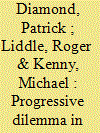

|
|
|
|
|
| Summary/Abstract |
This special edition reflects on the contemporary relevance of the insights and concerns of David Marquand's book The Progressive Dilemma. In this Introduction, the editors set the scene for these reflections. They consider the structural changes that have occurred in politics since the 1990s: the impact of globalisation, the erosion of class identities, the rise of ‘identity politics’ and the continued fragmentation of the party system. There has been no reconciliation between the parties of the centre-left, nor any re-examination of the ‘liberal tradition’ and the potential for a new synthesis with revisionist social democracy. On the one hand, Corbynism is a radicalised metropolitan species of liberalism, while on the other there are plenty in Labour who stress the need for the party to re-engage with the traditional, socially conservative values of the working class in a new ‘postliberal’ appeal. Yet the authors argue that those who broadly identify with progressive causes in British politics—animated by the various overlapping strands of social liberalism, social democracy and liberal socialism—have still to work out how to address the historic failings that Marquand so eloquently exposed, to create a new and inspiring intellectual vision that unites and energises the left and centre-left.
|
|
|
|
|
|
|
|
|
|
|
|
|
|
|
|
| 11 |
ID:
099090
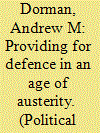

|
|
|
| 12 |
ID:
172393
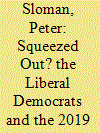

|
|
|
|
|
| Summary/Abstract |
The 2019 general election was a crushing disappointment for the Liberal Democrats, as Jo Swinson lost her East Dunbartonshire seat to the SNP and the party’s anti‐Brexit stance failed to deliver gains from the Conservatives. Although the Liberal Democrats’ poor performance can partly be blamed on a misfiring campaign strategy, it also reflected the structural difficulties which the party faces in an increasingly polarised political environment. The polarisation of public opinion along multiple axes over the last decade—over austerity, Brexit, and attitudes to Jeremy Corbyn—has fractured the broad coalition of support which the Liberal Democrats assembled during the 1990s and 2000s. Analysis of the 2019 results suggest that the party has made some progress towards developing a new core vote, particularly among suburban Remainers in south east England, but it is not clear whether this will be large or robust enough to have a significant impact on the future of British politics.
|
|
|
|
|
|
|
|
|
|
|
|
|
|
|
|
| 13 |
ID:
139056


|
|
|
|
|
| Summary/Abstract |
By the time Gordon Brown, Britain’s former Labor prime minister, arrived at the school in Nottingham where he was scheduled to speak, he was an hour late and the audience had dwindled to 130 people. Brown’s message was “Don’t lose hope.” He said Nelson Mandela once told him of a painting called Hope that he had kept on the wall of his prison cell in South Africa. It showed a girl wearing a blindfold, sitting on a globe trying to play a harp with all its strings broken. “[Mandela] was saying, even in a situation that seems hopeless, there is always hope,” Brown told his audience. “The Labor movement was built on hope.”
|
|
|
|
|
|
|
|
|
|
|
|
|
|
|
|
| 14 |
ID:
122125
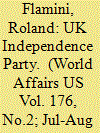

|
|
|
|
|
| Publication |
2013.
|
| Summary/Abstract |
The town of Eastleigh, in southeast England, doesn't normally make national news. It's old, but not antique. It was once known for its railroad industrial works that built powerful steam locomotives with names like King Arthur. But that was in the early twentieth century. Today, it's more of a dormitory town for larger, nearby cities like Southampton and Winchester. In March of this year, however, Eastleigh (population 120,700) dominated the political headlines and provided a preview of things to come, following a parliamentary by-election whose result seriously rattled the mainstream parties, particularly the governing Conservatives.
|
|
|
|
|
|
|
|
|
|
|
|
|
|
|
|
| 15 |
ID:
138277


|
|
|
|
|
| Summary/Abstract |
Parties in coalition governments must address the ‘unity/distinctiveness’ dilemma: how to maintain governing cohesion, while sustaining individual identities. Within the Cameron–Clegg government this is a challenge for both parties, but it is more so for the Liberal Democrats as the junior partner. This paper considers how the Liberal Democrats negotiated this dilemma in relation to ministerial portfolio allocations. While the Liberal Democrat strategy of placing ministers in almost all departments has served the Coalition well in terms of governing unity, it has limited the extent to which they have been able to assert their distinctive contribution to Coalition policy-making. This is demonstrated through an examination of the Liberal Democrats' influence on Coalition welfare policy. A lack of clear policy contributions is potentially highly damaging to the Liberal Democrats electorally, as it suggests that they have made little substantive contribution to the Coalition beyond propping up their Conservative partners. Accordingly, the paper reflects on lessons for junior partners in future UK coalition governments, suggesting that concentrating ministers within one or two departments may provide a more viable means of carving out a distinctive governing legacy.
|
|
|
|
|
|
|
|
|
|
|
|
|
|
|
|
| 16 |
ID:
111661
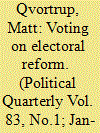

|
|
|
|
|
| Publication |
2012.
|
| Summary/Abstract |
Referendums on electoral systems are relatively rare. In most countries changes to the electoral system are enacted through the legislatures. The British referendum in May 2011 is thus one of the rare examples. In this article it is shown that the apparently idiosyncratic factors in the referendum were consistent with general trends identified in other referendums. While the media focused on the harshness of the campaign, the referendum also resulted in surprising coalitions between long-term foes, thus suggesting that the referendum contributed to cross-party cooperation rarely seen in a majoritarian system like that of Great Britain.
|
|
|
|
|
|
|
|
|
|
|
|
|
|
|
|
| 17 |
ID:
138281


|
|
|
|
|
| Summary/Abstract |
The chances of Labour winning the 2015 general election with a comfortable overall majority are vanishingly small. It could, however, emerge as the largest party or finish just a handful of seats behind the Conservatives. Either scenario would give it at least a chance—and a bigger chance than many realise, we argue—of forming a government. In that event, Labour may be faced with a choice between getting together with another party (or parties) to form a majority coalition or else forming a minority government (either on its own or with one or more partners), which could assemble different majorities for different pieces of legislation or try to negotiate a ‘confidence and supply’ agreement. Given the precedents from the UK and overseas, we argue that, faced with this dilemma, Labour should do all it can to form a majority coalition. We also argue that Labour can learn some useful lessons from the Cameron–Clegg coalition.
|
|
|
|
|
|
|
|
|
|
|
|
|
|
|
|
|
|
|
|
|